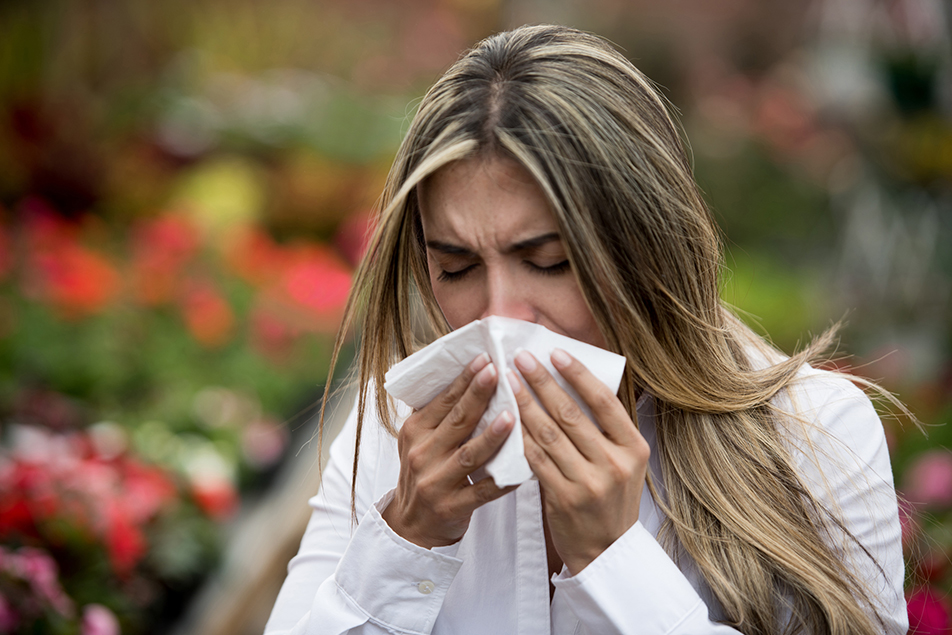
This post was written by Heather Willison, MSN, FNP-C, PPG – Allergy, Asthma, and Immunology.
I don’t know about you, but I’m tired of the snow and cold. Bring on spring! But I know that, for those with seasonal allergies, spring means itchy eyes, sneezing, and a runny or stuffy nose (or both). In our area, tree pollens typically make themselves known in early April and will continue to cause trouble until late May. Just when you think you are in the clear, grass pollen counts will rise as tree pollen counts taper off and continue to do so until mid-summer.
Pollen isn’t the only potential allergy trigger in the spring. The adage “April showers bring May flowers” is very true in the Midwest. This damp, rainy weather can bring about molds, which also play a role in triggering spring allergy symptoms.
Rather than feeling miserable, let’s learn how you can manage exposure and prevent symptoms, so you can really enjoy the warmer temperatures, sunshine, green grass and budding flowers this spring.
Quick tips for managing spring allergen exposure
- Check your local weather channel for pollen forecasts and counts so you can plan ahead.
- Keep windows and doors closed when counts are elevated, and turn on the air conditioning once the weather warms up enough to do so.
- Pollen counts are highest in the morning, so consider staying indoors until later in the day.
- After spending time outdoors, change clothes and shower to remove pollen.
- Avoid hanging linens or clothing outside to dry as they can collect pollen.
- Avoid spending time outside on windy days as this just stirs up the pollen in the air.
- Rainy days can be appreciated when you realize that rain knocks the pollen out of the air for a short time!
- Consider hiring someone to help with yardwork.
- Start taking your allergy medications 1-2 weeks before pollen counts are expected to rise. It is better to be proactive than try to play catch up later!
Over-the-counter allergy medications
There are several over-the-counter allergy medication options available. Some people find that oral antihistamines (i.e. Zyrtec®, Claritin®, Xyzal®, Allegra®) are most beneficial, while others prefer steroid nasal sprays (i.e. Flonase, Nasacort®, Rhinocort®). A combination of the two may provide even greater relief. You should exercise caution when using decongestants as they can lead to rebound congestion, and in some cases will elevate blood pressure. Finding what works best for you can take some patience.
There are also over-the-counter antihistamine eye drops (i.e. Pataday®, Zaditor®) that can help to alleviate itchy, watery, red eyes. Avoid eye drops that advertise “redness reliever” on the label as these may contain an ingredient that can cause rebound redness.
Spring allergies and asthma
Asthma symptoms (shortness of breath, chest tightness, coughing and/or wheezing) can flare if your allergy symptoms are not well controlled. If the over-the-counter options are not alleviating your symptoms, this is when it would be appropriate to schedule an appointment with an allergist. Allergists can complete testing that helps to identify which specific allergens are contributing to your symptoms.
If you have any questions or concerns, talk to your primary care provider or reach out to PPG – Allergy, Asthma and immunology at 260-425-6070 so that we can assist you with your allergy or asthma needs this spring. To increase accessibility and convenience for our patients, we are now offering appointments at offices on the north and southwest sides of Fort Wayne, and Auburn. We are pleased to announce that Dr. Diana Munoz-Mendoza has joined our practice, and Stacy Butler, FNP-C, will begin seeing patients later this spring.



